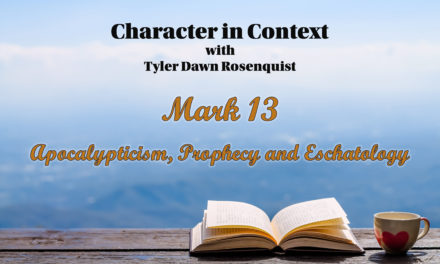I have always enjoyed teaching the ancient art of polemic but I have never actually taught Biblical irony before and I can tell you that it is absolutely a game changer for understanding how the Bible works, how the Kingdom of Heaven works, and how God works. I really enjoyed putting this one together, and I have some great book recommendations for you.
(My affiliate links for Amazon products are included in the post. As an Amazon Associate, I earn from qualifying purchases.)
If you can’t see the podcast player, click here.
Hi, I am Tyler Dawn Rosenquist and welcome to Character in Context, where I usually teach the historical and ancient sociological context of Scripture with an eye to developing the character of the Messiah. But not right now, right now I am doing a series about how to not waste your time with bad study practices, bad resources, and just the general confusion that I faced when I started studying the Bible and was trying to figure out what to do and whose books I should read. Bottom line, I read a lot of nonsense and spent a ton of money on it. I am going to give you some basics on how to avoid a lot of the pitfalls, save money, maximize your time and effort, and get the most out of what you are doing.
Master book list can be found here and I will add to it as needed. In fact, this week I am adding a book by GK Beale on the Theology of Irony (affiliate link) that I was able to pick up on logos on Black Friday—I won’t leave the house to go shopping but I always check out the book deals. And I will always spend way too much money—this year it was on the sixteen book commentary series that the irony book was part of. All I can say, guys, is thanks for the donations. And they will have more sales later in December. Last year I bought the entire Interpretations commentary series and the year before that it was the entire NSBT, New Studies in Biblical Theology series. But I make up for it by dressing in t-shirts and jeans and having no fashion sense, or getting my hair or nails done or going out to dinner. Books are like my only real vice. Oh, and bobbleheads. Forgot that.
Today we’ll be talking about two of my favorite rhetorical devices in the Bible—polemic and irony. Now, I also love puns but it is almost impossible to spot them in a translation so we’ll just skip over that—that’s what commentaries are for, to point them out. Polemic is a very ancient way of insulting someone or something through exaggeration and even mischaracterization or through comparison. The obvious places we find polemic in the Bible are the woes against Pharisaic doctrine in Matthew 23, and when Paul states that he wishes the circumcision group that was visiting Galatia would just go ahead and castrate themselves, and the idol polemics of Isaiah 44 and Jeremiah 10. Polemics, in context, often make a point by creating an outrageous caricature of the thing, person, or group being criticized. The problem with polemics is that if we do not understand them for what they are, forced exaggeration, we might take them for an accurate assessment of the thing being ridiculed. This is why, for example, Pharisees have been historically subjected to scorn and vitriol under the mistaken idea that because Yeshua/Jesus was drawing a generalization and following the rules of polemic (although he didn’t make the kind of the really nasty accusations that were common in the Greco-Roman world—like accusing them of seeing prostitutes or having prostitutes and drunkards as members). Polemic was used when anyone wanted to say, “follow me and not them” or “do this and not that” in a really jarring way. People didn’t indulge in polemic lightly—okay, they did in honor/shame societies but the Biblical version of polemic is excessively tame and restrained compared to what we see in the larger world.
So, rule #1 of polemic—you cannot take it at face value. The Pharisees weren’t really sepulchers filled with dead men’s bones nor were they personally guilty of killing the prophets, nor did they all wear tzitziot dragging on the floor or titles or whatever. This was a public caricature that pointed out the abuses in such a way as made them all look guilty, but we know that there were humble, godly Pharisees who followed Yeshua. Yeshua was polemically attacking a mindset of excessive legalism that was only doable for those of a certain class and education, and the elitism and exclusivity of table fellowship and hospitality that it led to. Hierarchies of those sort are absolutely opposed to the Kingdom way of living. Rule #2 of polemics—and this one is almost the same as the first—polemic isn’t a historically reliable way to understand ancient idolatry.
When we read Jeremiah 10 and especially Isaiah 44, and this was definitely the case before the surge in archaeological discoveries in the Near East over the last two centuries, we might get entirely the wrong idea about what idolatry looked like and how idols were viewed and what it meant to “worship” one. But when we understand them as purposefully distorting polytheistic worship in order to lampoon it—and then combine that with studying how the ancients really worshiped and believed—then we can truly appreciate what Isaiah and Jeremiah were trying to communicate. Both texts describe the idol-making process, and yet they make it sound like a hunk of wood overlaid with gold and silver and dressed in purple was actually believed to be a god. Of course, we know this isn’t true thanks to texts like the Erra Epic, which is so similar to what Jeremiah and Isaiah describe that it’s almost scary. The Erra Epic describes in detail the manufacture of the idol of Marduk from sacred wood and how the master craftsman shaped it and overlaid it with beaten plates of gold and silver to make the idol appear as though it is pure gold (exactly like the manufacture of the Ark of the Covenant which was acacia wood covered with beaten gold)—in fact, Herodotus thought it actually was made of pure gold when he wrote about it. However, whereas the Bible makes it sound like the hunk of wood is the god and that the worshiper believes that, we actually know that they believed it only held the essence of the god after the performance of the mouth-opening ceremony, and it was through this idol, which was more of a mediator, that the god could be virtually cared for and fed. Almost like an ancient video game. To the uninitiated, the polemic gives an almost entirely wrong idea of what was going on in the worshiper’s mind and in the mind of the idol maker.
But none of the original audience were uninitiated. Jeremiah and Isaiah were both speaking to people who were guilty of gross idolatry, and they were being confronted with a distorted image of it so that their eyes could be opened to how ridiculous it was that a god would even need such an image or that it would be something as base as wood. The polemic was designed to shame them by making what they were relying on look absolutely idiotic. They weren’t supposed to get technical and say, “Well, that’s not how an idol works, Jack!” They were supposed to consider how ludicrous it was to have a wooden human figure that had to be nailed down and propped up like a scarecrow (Jer 10) made out of a hunk of wood that wasn’t even sacred enough to prevent the Craftsman from cooking his lunch over the scraps later. It was just wood, it was just gold and silver, it was just dressed in royal robes—but nothing could really transform it into anything else than the wood it started out as. And someday, Indiana Jones would wreck an entire Temple complex just to take it and put it into a museum anyway. Just saying, that man might be entertaining but he is a menace, not an archaeologist—which was the first thing my archaeology professor taught us in college. He was actually quite angry about it. No one ever mentioned Indy again…
Other texts are polemical without being obvious. The Creation account, the flood account, and the division of the languages at Babel were all texts that were designed to make Yahweh look wise, powerful, caring, and generous while making His Babylonian counterparts look just horrid. No, He didn’t create the land by destroying another god and throwing down their body—as supposedly happened when Marduk defeated Tiamat in Enuma Elish. And the people weren’t created from the blood of Tiamat but from the good soil of the earth, nor were they created to be slaves, but image bearers. The flood wasn’t sent upon the earth for the arbitrary reason of the humans being so noisy that the gods couldn’t get enough sleep as we see in the Atrahasis Epic, it was instead a response to Creation being utterly ruined, unredeemable and chaotic, and in need of a reset. The languages weren’t divided as some sort of practical joke by a Sumerian deity either, but for the people’s own good. Yahweh is shown for who He is and what He is like in how He is portrayed as different from His Babylonian counterparts, who would have looked barbaric in comparison. It is very subtle, and easy to miss if you aren’t well versed in the mythology of Israel’s neighbors—but it is unmistakable. The first eleven chapters of Genesis just flat out made the gods of Babylon look like childish jerks.
Unfortunately, polemics taken out of their social context are often used by people to justify truly bad behavior when they lack mature fruit. People think that to be a prophet is to have carte blanche to vent their frustration without restraint—which is why so many vicious people self-identify as prophets. People love to use John the Baptist as an excuse but let’s remember that John wasn’t part of the New Creation but the old. Or they point out that Yeshua made a whip in the Temple and got rowdy, but that is more informed by artistic license than what is written. If He had actually gotten out of hand, the soldiers from the Fortress Antonia would have scooped him up in a hurry but would probably have found tables being tipped over and animals being herded off the Mount with a quirt to be entirely amusing. We have to understand the function of polemic in that society and cannot just use it to justify the flesh. Like I always say, you don’t get to make a ruckus unless you are willing to be crucified for the people you are ranting about. This shouldn’t be tried by folks who consider it a damning crime if people unfriend them on social media.
Now irony is something entirely different. And the only thing ironic about the song “Isn’t it Ironic” is the fact that there is not a shred of irony in any of her examples. Irony is a rhetorical device which actually under-girds just about every major story in the Bible. Irony is what you get when you say one thing but mean something entirely different, or do one thing and the opposite is the result. Irony isn’t rain on your wedding day, that’s just a total bummer. Irony is when your wedding dress is made out of divorce papers and yes, someone really did do that and I will link the article in the transcript. Irony is eating fruit to become like a wise god and ending up mortal and feeling like an idiot. Irony is selling your brother into slavery only to have him save you from starvation as the vice-regent of Egypt. Irony is defeating Satan by allowing his agents to kill you. Irony is the quiet arrival of a suffering Messiah when everyone is expecting the noise and pomp of a military Messiah. Irony is a expecting a Lion but getting a Lamb. Irony is every single instance of a disgraced, barren woman having a child who brings her more honor than all of the sons of her fertile counterparts together. Irony is Yahweh’s consistent favoring of second and youngest sons in a world where the eldest automatically received the honor and the double portion inheritance. Irony is Yahweh taking something terrible and ugly and fashioning it into something beautiful, or taking weakness and showing it as strength, destroying enemies through love and peace. Yahweh works through irony in our lives as well. How often does He completely turn situations around where one day we are as low as we can be and the next, we are on top of the world?
The Bible uses these ironic images as a rhetorical device to show how entirely different (1) God’s priorities are from ours, (2) God’s ways are from ours, and (3) how differently we view things than He does, and (4) how His Kingdom is upside down compared to everything we know from our own earthly experiences. But irony is also why it was so difficult for the majority of the Jewish people in the first century to see Yeshua as the Messiah. Instead of a conquering king, as the world would desire, we got a lamb whose robes are drenched in His own blood. Admit it, it makes no worldly sense whatsoever and so we very rightly look like demented nutjobs for believing it. I don’t understand why people get so irritated about unbelievers mocking us—makes perfect sense to me. Without experientially knowing God, I’d be shaking my head in disbelief at believers too. Irony, at its heart, is something that shouldn’t ever go down the way it did. David shouldn’t have defeated Goliath! The meek shouldn’t inherit anything! Recognizing irony when we see it is very important to truly understanding what the Bible is telling us. When, in Isaiah, Yahweh announces that He is doing a new thing—that shouldn’t shock us when we are well acquainted with the irony throughout the Bible. We should absolutely and always expect the unexpected.
Really, I would say that we can learn more about Yahweh from the irony of the Bible (and also our personal lives) than from just about anything else. I am going to mention a few categories of irony that we find in Scripture and I really owe my learning these to GK Beale—actually I owe so much to him for so many of his books I could just do a broadcast about that all by itself! Anyway, the book is called Redemptive Reversals and the Ironic Overturning of Human Wisdom: “The Ironic Patterns of Biblical Theology: How God Overturns Human Wisdom” (affiliate link) and you thought my book titles were excessively wordy! I ain’t got nothing on him—in more ways than one.
So, first we have cases where the punishment literally fits the crime, but in an ironic way, which is called retributive irony. We get a lot of this sort of language in the Proverbs and the Psalms—things like evildoers falling into the pits and snares that they set to capture the righteous. I would say that the three most prominent cases that I can think of are Haman from the book of Esther, Pharaoh drowning in recompense for drowning the Hebrew babies, and the account of David’s crimes and punishment in II Sam 11 and 12. Of course, Haman’s account is funny and David’s most certainly is not. Haman desired to kill all of the Jews within the Persian Empire because he was miffed that one wouldn’t scrape and bow before him. Tad bit excessive in my estimation. But Mordecai, the Jew who refused to bow, had saved the King’s life, before the time of Haman’s promotion. One night when the King couldn’t sleep, he asked for the royal historical records to be read to him and that would sure put me to sleep but the King realizes that nothing has been done for Mordecai. Haman walks in, the king asks his advice as to what should be done for someone the king wants to honor and Haman, humble guy he is, assumes that it is himself and lets loose with his wildest honor/share culture fantasies and then of course he is forced to personally do that for Mordecai. Haman’s entire scheme to execute the Jews became his own doom and he was hung on the very gallows he had prepared for Mordecai. The exalted shall be humbled and the humble shall be exalted, indeed! Mordecai even gets Haman’s newly vacated job.
We can also talk about restorative irony, or salvational irony. And a lot of these will overlap, of course. But every barren woman in Scripture ended up becoming the salvation of the nation through a miraculously born child. Sarah birthed Isaac, the beginning of the Nation of Israel. Isaac’s wife Rebekah birthed Jacob, the father of the Twelve Tribes. Rachel birthed Joseph, who saved not only his people but also the known world, from starvation. The wife of Manoah birthed Samson, who saved the children of Israel from the Philistines. Hannah birthed Samuel, and Elizabeth birthed John the Baptist. From dead wombs came life. If that isn’t irony then I don’t know what is. And not only life in the form of a child but life to the nation and therefore to the world. A virgin giving birth to One who would save the world is also ironic. Pretty much the last thing you would expect to happen. The fall of man was due to a man’s failure at the Tree of the Knowledge of Good and Evil and the salvation of man was also by means of a “tree”. How about the one sinless man who ever lived becoming a curse? That’s huge. Destroying your enemy by allowing them to kill you? How about what we are called to do—forgiving the unrepentant and blessing our enemies and not taking revenge. It’s the opposite of common sense. But this is the upside-down kingdom of God where up is down and left is right and tactics that should lead to disaster actually lead to victory. The other gods didn’t have to be trusted and couldn’t be trusted because they played by the rules of the world but we have to really trust Yahweh to live a cruciform life. That’s a fancy word that means “cross-shaped life”, a life of radical self-sacrifice.
We also see a lot of the power through weakness sort of irony. The Beatitudes have everyone who wasn’t blessed in the ancient world inheriting and conquering and being praised as the world would have never praised such people. We hear that in our weakness, He is strong. We must become like little children to enter the Kingdom of Heaven—and no one wanted that because of the ghastly high mortality rate of 72% not making it past their 16th birthday, or 30% past their first, and children weren’t really honored at all or even acknowledged by society. As Paul declared, the foolishness of God is wiser than the wisdom of this world. We conquer not through violence but through weakness. Mentioning the Beatitudes again, and the fruit of the Spirit—I cannot stress enough how absolutely wimpy and womanish these would have come across to men. Men had no need to be peaceable or patient or kind or whatever—you couldn’t gain any honor by living that way or protect your family and your interests. And so, you get these pushes for believing men to be masculine as the world defines masculinity. And they think it is counter cultural but it really isn’t, it’s just hearkening back to the pre political correctness era. But that sort of “manliness” isn’t Biblical but worldly. Great book on that is called Man Enough: How Jesus Redefines Masculinity (affiliate link) by Nate Pyle. As opposed to the book that just came out with a barely covered picture of a woman’s chest—with no head, of course, just the goodies—telling men that to be a Christian is to adhere to the standards of a specific era and trying to pass it off as Biblical. More like wishful thinking. And not only that but so objectifying of women…
Revelation is really big on irony and we would expect that from an apocalypse. In my favorite example, the Lion of Judah (an idiom for the Davidic King) is announced but no lion shows up—instead there is a little slaughtered Lamb, standing up. And that’s a powerful visual—even more so when we see the kings of the earth hiding from the wrath not of a lion but of a Lamb. In the Gospel of Mark we actually see a militant Messiah but He doesn’t go after the Romans—He goes after the residents of the demonic realm where the real battle is taking place. He shows that the real enemies aren’t the ones we can see but the ones behind the scenes using them.
Irony is faith building. More than that, to serve in an ironic Kingdom under the rule of an ironic God absolutely requires faith because we have to live in constant disbelief of what we see around us and we must believe that victory can be snatched from the jaws of certain defeat. Irony tells us that what we can see isn’t even half the story. Yeshua said that if we want to save our lives, we will lose our lives but if we lose our lives for Him, we will find life. And if we hear that as unbelievers, all of this really, then it sounds ludicrous but that is the strength of irony. Positive irony and cynicism don’t play well together, and by positive irony I mean the things that should go badly but work out in the end for our ultimate victory and sanctification. As Paul tells us in Romans 8:28, “We know that all things work together for the good of those who love God, who are called according to his purpose.” (CSB) And that means that bad stuff will happen to us but that God can and will ironically bring good out of it, even if it takes a long time. It doesn’t mean that our hardships and tragedies will be removed from us, but that they aren’t the end of the story. But to have that attitude requires trust and trust isn’t natural to us because we have had plenty of reason not to trust. But through the crazy ironies of this walk, we learn to trust. Without the irony, there would be no need because life would operate entirely according to the rules of cause and effect.
It was irony that made Joseph the viceroy of Egypt and Mordecai the second in command of the Persian Empire. It was irony that Satan’s greatest victory was also his downfall. The Bible is filled with impossibilities that are only possible because we worship a God who deals in the ironic. Understanding this will change how you study the Bible forever.





















